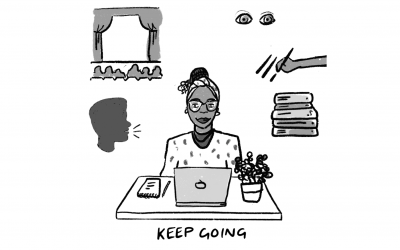Feeling time-poor, burned out and unable to concentrate on your work in progress? Changing how you feel about the time you have can transform your writing practice. It all starts with noticing.
No time to write
The most common complaint we hear from writers is that they don’t have enough time to write. Over many years of surveying writers about their habits, routines and goals, 90% want more time to write (yes, there’s a lucky 10% with too much time, but they have different struggles – if that’s you, read this). It’s all too common for us to feel time-starved, that we used to have more time, and collectively that our time has become ever more pinched. Yet longitudinal time use studies fine that people have pretty consistent allocation of time for their daily tasks. The issue is how we perceive time – not whether you have a lot or a little of it. John Robinson, nicknamed Father Time by his colleagues at the University of Maryland, headed up the Americans’ Use of Time Project. For decades he’s been busting time usage myths. Take the extreme workweek where people put in 70+ hours at the office. Robinson studied these workaholics and found that those claiming to work over 75 hours a week, actually worked 55 hours. It’s not just time at work that gets inflated; we overestimate how much time we spend on household chores. While we highlight the hustle we downplay the joy – both sleep and leisure activities are frequently underestimated. Robinson’s body of research shows, consistently and repeatedly, our inability to assess how we spend our time.
You have more time than you think
Laura Vanderkam’s classic time management book 168 Hours: You Have More Time Than You Think makes a powerful argument for time tracking. It’s the gold-standard statistical audit favoured by sociologists and used in Robinson’s research and the decades-long American Time Use Survey. Delving into time dairies led Vanderkam to believe two simple things:
- you can choose how to spend your 168 hours
- you have more time than you think.
Tracking your time in either 15 or 30 minutes blocks provides not just data but insight. Once we see where our time goes then we can make choices about how we spend the 168 hours that make up our week. “Recognize that time is a blank slate,” says Vanderkam. “The next 168 hours will be filled with something, but what they are filled with is largely up to you.” >> Read more: A guide to tracking your writing – why noticing how you write will transform your practice While I wholeheartedly agree with Vanderkam’s premise, I’m struggling with the argument about freedom of choice. As the saying goes, we might have as many hours in the day as Beyonce. However…
You have less time than you want
The pandemic has created a time management crisis. While trends might show we have more leisure time than past generations – tell that to someone working from home while homeschooling their kids. Data show how the pandemic had very real impacts for many, with some of us having little control over our time. Many have had their time co-opted by additional caring responsibilities. Commuting to the office has been replaced by an extended workday, back-to-back zoom calls, a different and pernicious presenteeism. When the pandemic hit, my experience in ‘creative productivity’ was called on by organisations. My advice on making time for creative or entrepreneurial side projects was of interest in-house as innovation and thinking time was squeezed out by online meetings. >> Read more: How to make time to write – 4 approaches to finding time in busy schedules Time pressure was increasing. Employees were struggling to adjust to home-working. Managers were worried about work-life balance. The systems HR had created for wellness in the office weren’t working at kitchen tables. At Prolifiko, our work researching academic writers led to work with publishers and universities. We undertook several studies – both qualitative and quantitative – exploring burnout in researchers, like this one featured in The Scholarly Kitchen.
Burnout is everywhere
Burnout, once restricted to medical and caring professions, is now an everyone problem. Gallup’s Perspective on Employee Burnout: Causes and Cures analysed 24,522 full-time workers. While the data was pre-pandemic, the finding are still helpful. It found that one of the main drivers of burnout was unreasonable time pressure. Having aggressive deadlines and pressure can create a snowball effect, leading to poor work experience, stress and increasing inefficiencies. Working harder or for longer hours is counter-productive. Burnout creates an increasing sense of alienation. Tasks that once brought joy and fulfilment now bring stress and frustration. That is the case in work, life and writing, which is our area of interest. We’ve witnessed an increasing lack of control experienced by writers. That includes academic researchers and business writers whose careers and livelihoods depend on writing, as well as novelists and non-fiction writers who create on the side. They have no time to write, when they do write, they are disengaged, unable to concentrate. There’s a feeling of alienation from their writing projects created by the pandemic and compounded by lockdowns.
Acceptance not optimising
It’s true that we do have more time than we think. It’s also true that many of us have little control over our time and are feeling burned out. While the optimism shared by Vanderkam is hard to sustain at the moment, her central hypothesis still holds. Understanding how we spend our time will give us to data to make better decisions. >> Read more: Time confetti – snatching time to write when you have none But rather than thinking about optimising, I encourage writers to start with acceptance. It is frustrating to have only time confetti available, but don’t waste your energy on anger. Instead, be realistic about the time you have, accept this and then take action.
3 tips for feeling OK about time
-
-
- Start by paying attention to what you do; when you do it, and how long it takes. You can scribble in a notebook, track it in a spreadsheet or download Vanderkam’s ‘time makeover’ guide.
- Armed with knowledge you need to turn anger into acceptance. You may be frustrated at wasting writing opportunities, or feel sadness at being so squeezed. Either way, come to terms with how much or how little control you have over your time.
- Now you can figure out what to do with that time. It may involve making trade-offs, having hard conversations with family members, negotiating with your bosses. Gain control over what time you have and let go of what’s beyond your influence.
-




